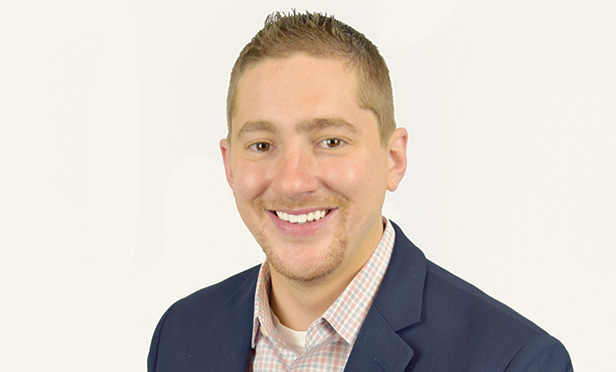 “There's a growing number of younger advisors who want to disrupt everything.”
“There's a growing number of younger advisors who want to disrupt everything.”
Derek Rine is a group benefits consultant at David Rine Insurance, one of the premier insurance organizations in northeast Ohio.
Paul Wilson: How did you get started in the benefits industry?
I got into the family business, my dad's firm, when I was about 20 and started working part time on the P&C side. I helped with customer service and answered the phones. I was getting a degree in marketing and sales and graduated the year after.
Right about that time, the ACA started coming into play. It wasn't fully implemented yet, but I saw the panic among agents. I heard people saying, “If this goes through, I'm selling my book of business.” And I thought, if I can figure this out, it might be the opportunity of a lifetime.
Related: Brokers and ACA: Outwit, outlast, outplay
I told my dad, “I think I need to be on the health side. There's so much opportunity there right now.” He agreed and gave me two or three small groups to manage so I could learn. Within a couple of months of researching self-funding and anything I thought would differentiate me, I closed a 160 life group and a 120 life group in a two-week period. That was pretty dramatic at the time, because I was only 23, but I had strategies that no one else in our area had at the time.
PW: How did you find these strategies so early in your career?
I think a few things worked to my advantage. I had more time than other advisors to research because I didn't have a big book of business yet. I was surviving off a small base salary and living in an apartment with a roommate. I didn't need a crazy amount of income and I had a lot of time to put into researching strategies and marketing myself.
Also, a lot of people reach out to benefits agencies on a daily basis, but most brokers just ignore the pitches because it's too much time and effort to try anything new. But there's a growing number of younger advisors who want to disrupt everything. We're often the ones who are putting these plans into action and because we're near the beginning of our careers, we're trying to make a name for ourselves.
PW: What are the challenges you face as an innovator?
I often face pushback when we try something new and it goes wrong, which does happen. You have to have an answer for it. You're the subject matter expert; you're the one who brought something new to the table. This was especially hard when I started, because when something goes wrong for a 23-year-old, it's not the same as it is later in your career. Someone who's 50 can look a CFO in the eye and say, “I have decades of experience; relax, I've got this.” A 20-something can't say that.
But even though trying new things can be tough or intimidating, you can't afford not to innovate, because there's too much opportunity. I have candid conversations with employers and say, “I've researched and vetted this. I've talked to references. I feel comfortable with it, and it's in compliance, but we're in this together from the start. There may be a few bumps in the road, so we've got to figure this thing out.”
PW: What objections do you hear and how do you handle that?
My number one barrier is not the CFO; I have self-funded clients where things are rocky to start because I put cost-containment measures in place and their employees push back. Many have never had someone managing their benefits before. They've never had a medical management team say, “We think you should use this provider because, based on quality metrics, the price and the volume this surgeon's done, we can get a better rate and better outcomes.” They hear that and say, “Screw you, my doctor told me to go here.”
They've never had a fiduciary PBM deny an Rx claim because it was unnecessary, or because there was a viable generic alternative. Before, employees had a free Visa card where they could go wherever they wanted and spend whatever they wanted to.
There's absolutely pushback from employees, so we have to get as many educational pieces out as we can. Here's what to expect. Here's what these various medical management and prescription advocacy companies are going to do to keep your premiums down in the future. We also give them financial incentives that are built in, which is something more good consultants are doing. We have to keep the conversation positive, incentivize employees and let them know that these new steps will help keep costs down.
PW: Many brokers are great at what they do, but not necessarily good business owners. Is that something you work hard to maintain?
Yes, I have fun being creative, but not necessarily running the business. The most fun I have is that moment where I connect two dots and ask my client, “Can you believe we can save money by doing this?” And they say, “Derek, you just saved my life; you just opened up $25,000 in new capital I can use.”
Running the business is more of a challenge. Fortunately, my dad is still involved with that for now. I'm the VP and benefits practice leader at the firm, so I'm the number two guy, but in the near future, I imagine I'll probably hire a COO. In order for me to be able to do the things needed to continue to drive the business forward, I have to have somebody who can run the show and handle the day-to-day operations.

PW: With your dad on the P&C side, how much do you work together and cross sell?
Many agents keep the P&C and benefits separate. It's always seemed kind of bizarre to me—why wouldn't you just take over the entire insurance arrangement for clients and become the insurance consultant? Once they love us on one side, we usually get the other, and they rarely leave. It's so convenient for them, and we do a great job. They have one or two points of contact within the firm, so they can be on the line with someone on the P&C side and say, “Hey, can you transfer me over to Derek real quick? I have a couple of questions.”
PW: How do you provide maximum value with a relatively small team?
When I'm interviewing employers, I say, “I'm a best-in-class consultant and a creative liaison. We're not just a 11-person shop, we're a 500-person shop, because I bring a CPA and a concierge service that's 24/7. I have one of the top benefits attorneys in the country on retainer, and a compliance team who handles your complete 5500 reporting. I'm only taking five or 10 consulting arrangements each year because the amount of time and effort I have to spend to deliver the results I've promised is so large.”
We've passed on prospects this year that we didn't think would be a good fit. They weren't willing to do what we were suggesting to contain their costs so we said, “Hey, we're probably not the right broker for you.”
PW: How important has collaboration been to your career?
I love collaboration. It's one of those thing where you're selfish and you're scared until you actually do it. Anyone who has a sound business mind has to be a little skeptical and worry that someone's going to take their proprietorial ideas. But being part of a group where there are brokers across the country is a dream come true. It made my purpose bigger, because we're part of a national movement to reverse the health care situation. It's given my career and life so much more meaning and purpose. Before, it was all about revenue and generating business. But now, it's bigger than that.
PW: What are your favorite things about your job?
I love interacting with people and helping employees. I love feedback from employers and saving companies money. Today, I told one of my larger clients that we saved them $142,000 on kidney dialysis. It got billed for $170,000 and we got it reversed down to $26,000. I love when our solutions work and I can quantify and measure the results. That's what keeps me going.
PW: What are your sources of inspiration and innovation?
I'm a man of faith, so that's big for me. Also the drive to help others and make a difference.
And my dad is the one who got me started in the industry. He inspired me to take this in a different direction and showed me the future of what our firm could be and do. He's given me a lot of vision, focus, drive and support.
PW: Finish this sentence: The key to success in this industry going forward is…
Thinking outside the box. Stay creative, because new barriers and challenges will always arise.
© 2025 ALM Global, LLC, All Rights Reserved. Request academic re-use from www.copyright.com. All other uses, submit a request to [email protected]. For more information visit Asset & Logo Licensing.







